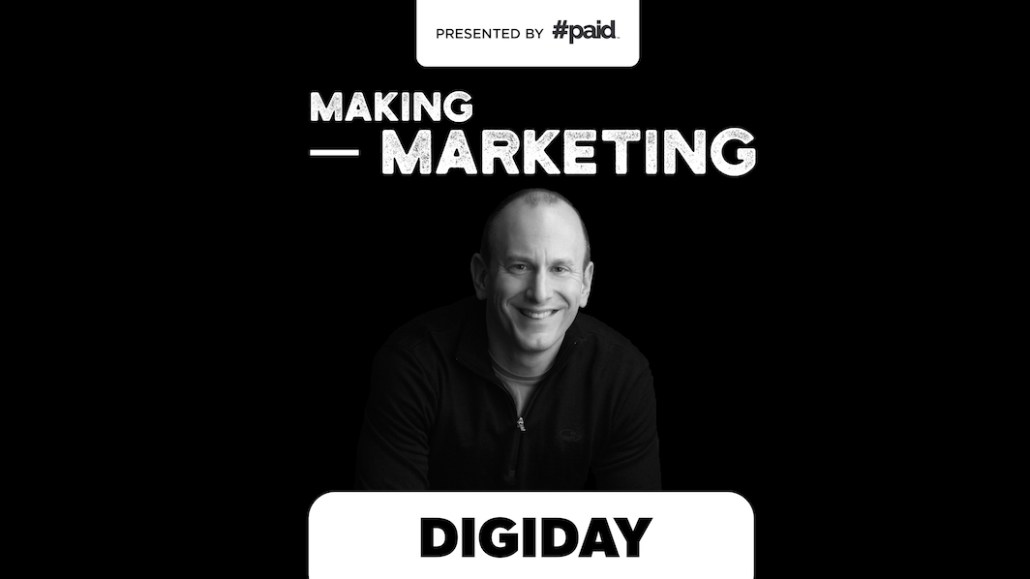Secure your place at the Digiday Publishing Summit in Vail, March 23-25
Audible CMO John Harrobin: The broken windows theory of customer experience is myopic

Subscribe: iTunes | Google Play | Stitcher | RSS | Anchor
Amazon doesn’t just dominate the market for paperbacks and e-books. Through its subsidiary Audible, it has the audiobook market (worth $2.1 billion, according to Bloomberg) cornered, too.
It’s also not limiting themselves to putting existing books on tape. “We want to give our customers experience beyond traditional audiobooks,” said Audible CMO John Harrobin. The company’s range of audio products — like Audible-exclusive books and listenable stories from The New York Times — means that “competition is anything that you can do when your eyes are occupied but when your mind is free.”
Many of Audible’s subscribed listeners consume 80% of its content in just one format, whether e-book, print or audio. “But several people are choosing to listen to certain types of content via audio,” said Harrobin. “For example, many people that are e-book readers listen to non-fiction on audio, because they do it in their commutes. It’s not that escape moment for them where they’re relaxing and reading.”
On this week’s episode of Making Marketing, Harrobin talked about how the company serves as both a platform and a creator of original content, the reason brands are so bent on selling “purpose” and a serendipitously-named Kentucky Derby contender.
Here are a few highlights from the conversation, lightly edited for clarity.
Don’t sweat (just) the small stuff
“There’s so much buzz right now about customer experience and ‘the broken windows’ theory of customer experience: ‘If we just fix the little things, everything will come together magically.’ And I don’t dismiss the value in fixing the little things and the fact that one plus one could equal three. I believe that. But I believe myopically focusing on that is analogous to cost-cutting your way into growth. It just is illogical. It doesn’t scale and it doesn’t work. So while we have efforts to do that, we really focus on customers that love us. Our most passionate, engaged, enthusiastic customers. What are they doing that others aren’t?”
Why brands are selling “purpose”
“I believe that initially, marketing was very brand-focused, where you had a brand set of values and promises that you made to customers. Then, with the advent of the digital age, people started optimizing funnels and converting, and that’s very empirical, very quantitative. It’s like left brain meets right brain. And I think, go back about 10 years, there’s almost this tension between each side. And I believe that the reconciliation of that has resulted in purpose as a unifier between the brand marketers that speak to the heart and the empirical conversion marketer that speak to the head. That enables them to come together on one common mission.”
A horse by any other name
“Audible’s got OK brand awareness but not exception brand awareness. It’s a newer category. So we benefit from any cultural moment that we can latch onto. And this horse called Audible popped up in everybody’s Google feed as a potential Kentucky Derby winner. So I actually called the horse farm. And we sponsored the horse, and we got all this great exposure. All these great people came out and talked about how they’re rooting for Audible, and say what they’re listening to on Audible. We had no idea that it was going to get such traction. We thought it was relevant, fun, authentic. And we just leaned into it.”
More in Marketing

‘The conversation has shifted’: The CFO moved upstream. Now agencies have to as well
One interesting side effect of marketing coming under greater scrutiny in the boardroom: CFOs are working more closely with agencies than ever before.

Why one brand reimbursed $10,000 to customers who paid its ‘Trump Tariff Surcharge’ last year
Sexual wellness company Dame is one of the first brands to proactively return money tied to President Donald Trump’s now-invalidated tariffs.

WTF is Meta’s Manus tool?
Meta added a new agentic AI tool to its Ads Manager in February. Buyers have been cautiously probing its potential use cases.





